Share
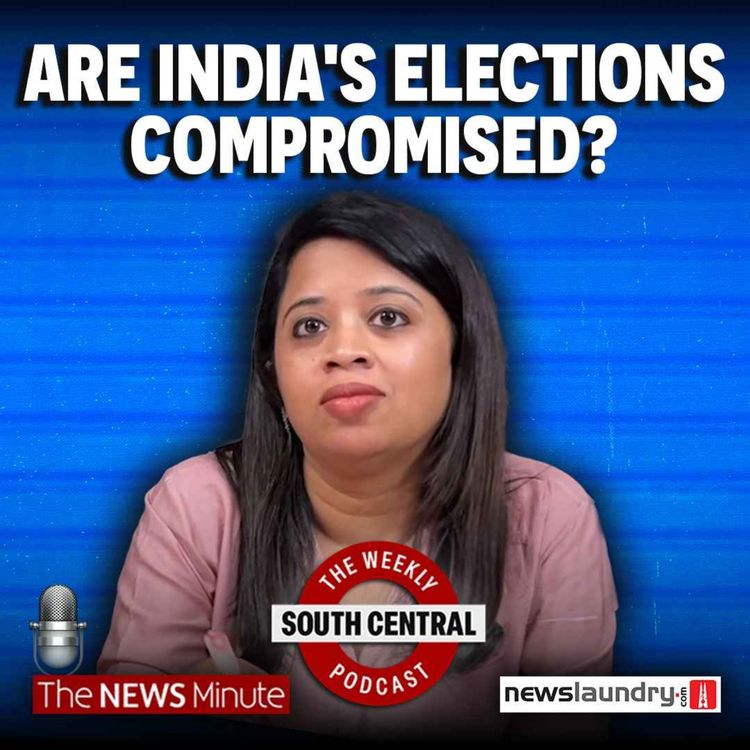
South Central
South Central 18 | Electoral Integrity & Bengaluru's Governance Dilemma
The 18th episode of South Central, a weekly podcast hosted by TNM’s editor-in-chief Dhanya Rajendran and editorial head for reporting Pooja Prasanna, discussed concerns of electoral roll manipulation and Bengaluru’s governance challenges. Joining them were senior editor Nandini Chandrashekar, Nitin Sethi, the founding editor of Reporters' Collective, and activist Tara Krishnaswamy.
Nitin Sethi highlighted serious concerns regarding electoral rolls. He said, "Voter list manipulation has been part of the game for a fairly long while. If you look at election records, you’ll ghost voters up to two, three lakhs in a population of twenty lakhs. Now, technology allows rigorous manipulation at a greater scale. If any party, with a considerably large number of workers try to do this, they can affect it at scale. At this moment, we do not have adequate safeguards to ensure the credibility of the electoral process."
Nandini Chandrashekar raised concerns about voter disenfranchisement, pointing out systemic issues within the electoral process. She highlighted, "Faulty voter rolls and procedural errors deny citizens their right to vote effectively. These errors severely hinder democratic participation."
Tara Krishnaswamy focused on Bengaluru's governance issues, particularly criticising the Greater Bengaluru Governance Bill. She argued, "This Bill centralises administrative control instead of empowering local bodies, undermining local governance and accountability. It moves us further away from decentralisation."
The episode delves into both the electoral concerns of the country in general, and Bengaluru’s governance conundrum.
Write to us on what you would like to speak about to southcentral@thenewsminute.com
Audio Timecodes
00:00:00 - Intro
00:03:17 - Reporter's Collective
00:01:40- Announcements
00:10:20 - Headlines
00:13:09 - Flaws in Electoral Process
00:44:59 - Greater Bengaluru Bill
01:07:15- Recommendations
Check out the recommendations and references from this episode.
Become a subscriber- Click here.
Contribute to our reporting fund. Click here.
To not miss any updates, join TNM's WhatsApp Channel! Click here
Produced by Bhuvan Malik, edited by Jaseem Ali
More episodes
View all episodes

64. Karnataka’s ban on teenage mobile use and Kerala Story 2’s divisive agenda | South Central Episode 64
01:22:58||Season 1, Ep. 64In this episode of South Central, hosts Dhanya Rajendran and Pooja Prasanna first discuss the Karnataka government’s plan to ban teenagers from using mobile phones. They are joined by policy researcher Tara Krishnaswamy, child psychologist Sama Adil, and Adhira S Magesh, a teenager who is a Karate black belt holder and enthusiastic baker. In the second part of the discussion, the hosts delve into the upcoming film The Kerala Story 2 and its polarising politics. They are joined by professor, writer, and activist NP Ashley.Once a month, we will invite one TNM subscriber to the show. Write to us on what you would like to speak about to southcentral@thenewsminute.com Send your thoughts, suggestions and criticism as well. You can also let us know what you think by filling out our quick feedback form. Your suggestions help shape future episodes of South Central. Check out the recommendations and references from this episode.Audio Timecodes 00:00:00 - Introduction00:01:15 - Headlines 00:09:32- Mobile Ban 00:43:49 - Kerala Story 21:19:57 - RecommendationsBecome a subscriber - Click here.Contribute to our reporting fund. Click here. To check out our other shows, Click here To not miss any updates, join TNM's WhatsApp Channel! Click hereProduced by Bhuvan Malik, edited by Jaseem Ali, written by Sukanya Shaji.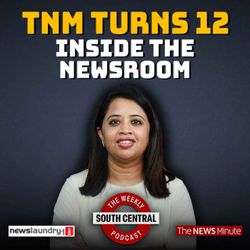
63. TNM turns 12 and here is how we got this far | South Central Episode 63
01:20:09||Season 1, Ep. 63The News Minute turns 12 on February 21, and to commemorate, in this week’s South Central, hosts Dhanya Rajendran and Pooja Prasanna bring together the old and new team of TNM. The group goes over how TNM started– a one-room venture with an intern and one reporter, and traces how it grew into a steadfast newsroom with several journalists, focusing on caste, gender, power, and culture.Once a month, we will invite one TNM subscriber to the show. Write to us on what you would like to speak about to southcentral@thenewsminute.com Send your thoughts, suggestions and criticism as well. You can also let us know what you think by filling out our quick feedback form. Your suggestions help shape future episodes of South Central. Check out the recommendations and references from this episode.Become a subscriber - Click here.Contribute to our reporting fund. Click here. To check out our other shows, Click here To not miss any updates, join TNM's WhatsApp Channel! Click hereProduced by Bhuvan Malik, edited by Jaseem Ali, written by Sukanya Shaji.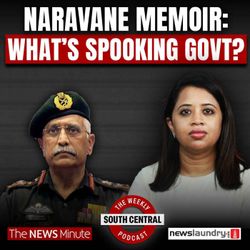
62. Naravane Memoir, LAC China Claims & Questions for the Govt | South Central Episode 62
01:10:35||Season 1, Ep. 62This week, hosts Dhanya Rajendran and Pooja Prasanna discuss the controversy over former Army Chief General MM Naravane's unpublished memoir, Four Stars of Destiny, and the political storm it has stirred in the Parliament. They are joined by senior journalist and founding editor of The Wire, MK Venu, and Caravan magazine’s Consulting Editor, Sushant Singh, who wrote about the book.Once a month, we will invite one TNM subscriber to the show. Write to us on what you would like to speak about to southcentral@thenewsminute.com Send your thoughts, suggestions and criticism as well. Audio Timecodes 00:00:00 - Introduction00:02:19 - Headlines 00:13:00- Naravane’s memoir00:56:47 - Free Speech 1:04:31 - RecommendationsYou can also let us know what you think by filling out our quick feedback form. Your suggestions help shape future episodes of South Central. Check out the recommendations and references from this episode.Become a subscriber - Click here.Contribute to our reporting fund. Click here. To check out our other shows, Click here To not miss any updates, join TNM's WhatsApp Channel! Click hereProduced by Bhuvan Malik, edited by Jaseem Ali, written by Sukanya Shaji.
61. India-US trade deal and Karnataka’s plan to bring back student elections | South Central Podcast
01:32:11||Season 1, Ep. 61In the first session, hosts Pooja Prasanna and Anisha Sheth discuss the India-US trade deal and the recently announced reduction in tariffs. They are joined by senior journalists Smita Sharma and TK Arun. In the second part of the discussion, the hosts delve into the ban on student elections in Karnataka and the Congress government’s proposal to bring it back. They are joined by Professor Muralidhar PS of the Bangalore University, President of the Teacher’s union.Once a month, we will invite one TNM subscriber to the show. Write to us on what you would like to speak about to southcentral@thenewsminute.com Send your thoughts, suggestions and criticism as well. Audio Timecodes 00:00:00 - Introduction00:04:26 - Headlines 00:16:40- India-US Tariff1:05:32 - Campus Politics Returns?1:29:22 - Recommendations You can also let us know what you think by filling out our quick feedback form. Your suggestions help shape future episodes of South Central. Check out the recommendations and references from this episode.Become a subscriber - Click here.Contribute to our reporting fund. Click here. To check out our other shows, Click here To not miss any updates, join TNM's WhatsApp Channel! Click hereProduced by Bhuvan Malik, edited by Jaseem Ali, written by Sukanya Shaji.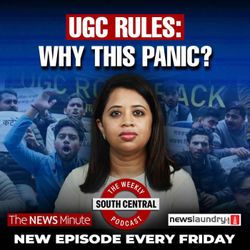
60. UGC rules protests and the myth of “misuse”, Kerala SNDP-NSS breakup | South Central Episode 60
01:26:56||Season 1, Ep. 60In this episode of South Central, hosts Dhanya Rajendran and Pooja Prasanna first discuss the new UGC equity regulations and the protests around them. They are joined by TNM’s Executive Editor Sudipto Mondal and rights lawyer Mridula Vanangamudi. Then they look at the fast-paced political negotiations and developments in Kerala, headed for Assembly polls soon. The hosts are joined by Damodar Prasad, a senior political analyst based in Kerala.Once a month, we will invite one TNM subscriber to the show. Write to us on what you would like to speak about to southcentral@thenewsminute.com Send your thoughts, suggestions and criticism as well. Audio Timecodes 00:02:47: Headlines 00:09:36 - UGC Rules 00:50:37 - Kerala Politics 1:20:52 - RecommendationsYou can also let us know what you think by filling out our quick feedback form. Your suggestions help shape future episodes of South Central. Check out the recommendations and references from this episode.Become a subscriber - Click here.Contribute to our reporting fund. Click here. To check out our other shows, Click here To not miss any updates, join TNM's WhatsApp Channel! Click hereProduced by Bhuvan Malik, edited by Jaseem Ali, written by Sukanya Shaji.
Cinema, Politics and the War on Film Critics | South Central Podcast ft. Sucharita Tyagi, Anna MM Vetticad
01:26:54|In this episode, hosts Dhanya Rajendran and Pooja Prasanna discuss the organised hate campaigns against film reviewers in the country. The discussion spans themes including the communal profiling of actors and reviewers and delves into whether fan culture catalyses the polarisation of films based on nationalism, religion, and gender politics. Joining the hosts are acclaimed film critics Anna MM Vetticad and Sucharita Tyagi.Once a month, we will invite one TNM subscriber to the show. Write to us on what you would like to speak about to southcentral@thenewsminute.com Send your thoughts, suggestions and criticism as well.Audio Timecodes 00:00:00- Introduction 00:01:46 - Headlines 00:14:34- Film Review Backlash01:23:27- RecommendationsYou can also let us know what you think by filling out our quick feedback form. Your suggestions help shape future episodes of South Central. Check out the recommendations and references from this episode.Become a subscriber - Click here.Contribute to our reporting fund. Click here. To check out our other shows, Click here To not miss any updates, join TNM's WhatsApp Channel! Click hereProduced by Bhuvan Malik, edited by Jaseem Ali, written by Sukanya Shaji.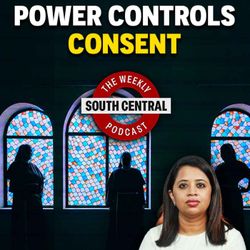
58. Franco to Rahul Mamkootathil, power rewrites consent | Karnataka's Stuck Govt | South Central Episode 58
01:26:20||Season 1, Ep. 58In the first session of the episode, hosts Dhanya Rajendran and Pooja Prasanna discuss the intersection of consent, agency and institutional power in sexual assault cases, like in the cases of Kerala MLA Rahul Mamkootathi, acquitted Bishop Franco Mulakkal, ex-BJP MLA Kuldeep Sengar and more. The hosts are joined by senior journalist Nidhi Suresh, TNM Associate Editor and gender journalist Sukanya Shaji, and senior journalist and teacher Maya Sharma.In the second part of the discussion, the hosts and Maya delve into Karnataka’s so called ‘government on maintenance’ and allegations of the Congress squandering away its power.Once a month, we will invite one TNM subscriber to the show. Write to us on what you would like to speak about to southcentral@thenewsminute.com Send your thoughts, suggestions and criticism as well.Audio Timecodes 00:00:00- Introduction 00:02:27 - Headlines 00:10:40 - Power rewrites consent00:59:06 - Karnataka Govt01:17:29- RecommendationsYou can also let us know what you think by filling out our quick feedback form. Your suggestions help shape future episodes of South Central. Check out the recommendations and references from this episode.Become a subscriber - Click here.Contribute to our reporting fund. Click here. To check out our other shows, Click here To not miss any updates, join TNM's WhatsApp Channel! Click hereProduced by Bhuvan Malik, edited by Jaseem Ali, written by Sukanya Shaji.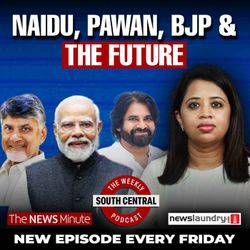
56. Chandrababu Naidu’s RSS shift and the Kochi Biennale controversy | South Central Episode 57
01:20:45||Season 1, Ep. 56In this episode of South Central, hosts Dhanya Rajendran and Pooja Prasanna first discuss the recent political developments in Andhra Pradesh, including CM Chandrababu Naidu’s growing affiliation with the BJP. They are joined by professor, politician, and political analyst K Nageshwar.In the second part of the discussion, the hosts delve into the controversy at the Kochi Biennale, where a painting by artist Tom Vattakuzhy, titled ‘Supper at Nunnery’ was withdrawn due to pressure from Christian groups. The hosts also discuss resistance to art in general, and are joined by Kavitha Balakrishnan, an art history lecturer, poet, curator and author.Read the Sridhar Vembu profileOnce a month, we will invite one TNM subscriber to the show. Write to us on what you would like to speak about to southcentral@thenewsminute.com Send your thoughts, suggestions and criticism as well. Audio Timecodes 00:00:00- Introduction 00:02:05 - Headlines 00:10:10 - Andhra Politics 00:52:05 - Kochi Biennale Row 01:15:39- Recommendations You can also let us know what you think by filling out our quick feedback form. Your suggestions help shape future episodes of South Central. Check out the recommendations and references from this episode.Become a subscriber - Click here.Contribute to our reporting fund. Click here. To check out our other shows, Click here To not miss any updates, join TNM's WhatsApp Channel! Click hereProduced by Bhuvan Malik, edited by Jaseem Ali, written by Sukanya Shaji.
56. 10-minute delivery at what cost? South Central on gig worker rights | Episode 56
01:31:53||Season 1, Ep. 56In this episode of South Central, hosts Dhanya Rajendran and Pooja Prasanna first discuss the strike by gig workers on December 25th and 31st, what their demands are and whether the existing framework of payouts and stipulated minimum delivery time violates their rights.The hosts are joined by Shaikh Salahuddin, founder and president of Telangana Gig And Platform Workers Union, and Maitreyi Krishnan, a lawyer and president of the All India Lawyers Association for Justice.In the second part of the discussion, the hosts delve into the upcoming elections in Kerala and Tamil Nadu and what alliances will fly and which of them will likely fail. The hosts are joined by senior journalist Dr RK Radhakrishnan.Once a month, we will invite one TNM subscriber to the show. Write to us on what you would like to speak about to southcentral@thenewsminute.com Send your thoughts, suggestions and criticism as well.Audio Timecodes 00:00:00- Introduction 00:03:10 - Headlines 00:12:03 - Gig Workers Strike 00:52:16 - TN & Kerala Elections 01:27:02- RecommendationsYou can also let us know what you think by filling out our quick feedback form. Your suggestions help shape future episodes of South Central. Check out the recommendations and references from this episode.Become a subscriber - Click here.Contribute to our reporting fund. Click here. To check out our other shows, Click here To not miss any updates, join TNM's WhatsApp Channel! Click hereProduced by Megha Mukundan, edited by Jaseem Ali, written by Sukanya Shaji.